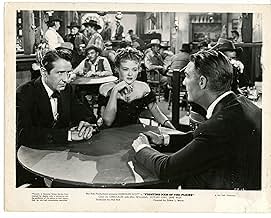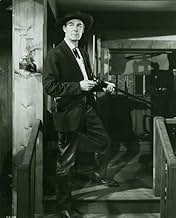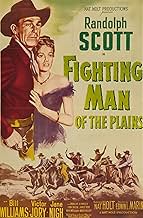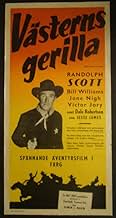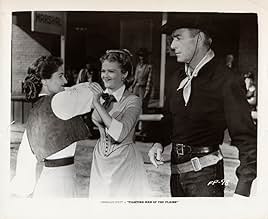Former bandit Jim Dancer becomes marshal of a Kansas town and cleans up the criminal element--with help from an old pal, Jesse James.Former bandit Jim Dancer becomes marshal of a Kansas town and cleans up the criminal element--with help from an old pal, Jesse James.Former bandit Jim Dancer becomes marshal of a Kansas town and cleans up the criminal element--with help from an old pal, Jesse James.
- Director
- Writer
- All cast & crew
- Production, box office & more at IMDbPro
6.5675
1
2
3
4
5
6
7
8
9
10
Featured reviews
Fighting Man of the Plains
Randolph Scott plays a bit of a poacher-cum-gamekeeper in this western adventure. Here, he ("Dancer") starts off riding with the infamous Capt. Quantrill during the American Civil War. He is misled by his cohort "Yancey" (Paul Fix) into believing that an old man they encounter in Kansas killed his father, so he does for him too. It soon turns out, though, that it was the deceased man's brother that did the deed, and by now "Dancer" is being sought by the authorities. When he is apprehended, serendipity take a fateful hand as his captor is accentually killed and he assumes his identity, Next thing, he's a town marshal and a battle royal is shaping up between his new found friends and his old protagonist "Slocum" (Barry Kelley). The sequential nature of the story telling keeps the action coming thick and fast, and Scott does an adequate job. The rest of the cast are neither here nor there, though - especially the really rather lacklustre Jane Nigh ("Florence") and an oddly un-menacing "Tancred" (Bill Williams). Still, its almost bang on 90 minutes, and makes for a perfectly watchable western feature with plenty going on.
Randolph Scott is fine in interesting B-western that's above average...
One of the nice things about FIGHTING MAN OF THE PLAINS is seeing VICTOR JORY in a role where he's playing the hero's friend rather than a villain. It's an above average RANDOLPH SCOTT western that was apparently filmed originally in Cinecolor but the TCM print is in B&W.
Scott is a man running from his past who is mistaken for the lawman who captured him but got killed along the way to bringing Scott to justice. We learn later that Scott was justified in killing a man in self-defense and did not deserve a reputation as a lawless outlaw.
He proves such a good shot when attacked by a town bully, that the townspeople appoint him sheriff of a small Kansas town, post-Civil War 1870s. He's able to keep that disguise for most of the story, until some of the crooked elements in town find out his true identity and make trouble for him before he can explain what happened.
The whole story has a pleasant Zane Grey feeling about it--although it's an original one written for the screen. BILL WILLIAMS is cast against type as a villain and JANE NIGH is the romantic interest as Jory's business partner.
Plenty of action and a colorful story combine to make a good Randolph Scott western worth catching. DALE ROBERTSON is introduced as Jesse James, a man who comes to Scott's rescue when the going gets tough.
Scott is a man running from his past who is mistaken for the lawman who captured him but got killed along the way to bringing Scott to justice. We learn later that Scott was justified in killing a man in self-defense and did not deserve a reputation as a lawless outlaw.
He proves such a good shot when attacked by a town bully, that the townspeople appoint him sheriff of a small Kansas town, post-Civil War 1870s. He's able to keep that disguise for most of the story, until some of the crooked elements in town find out his true identity and make trouble for him before he can explain what happened.
The whole story has a pleasant Zane Grey feeling about it--although it's an original one written for the screen. BILL WILLIAMS is cast against type as a villain and JANE NIGH is the romantic interest as Jory's business partner.
Plenty of action and a colorful story combine to make a good Randolph Scott western worth catching. DALE ROBERTSON is introduced as Jesse James, a man who comes to Scott's rescue when the going gets tough.
Interesting Scott Western
An unusual, slightly quirky Randolph Scott western with Scott playing a reformed outlaw keeping the peace with more amiable roles than usual for Victor Jory and Berry Kroger, and Jane Nigh as a rather equivocal female lead. There are also brief appearances by Dale Robertson with an introducing credit as Jesse James and James Griffith making an even briefer appearance in the opening scene as the despicable William Clarke Quantrill.
Wanted For Murder. Jim Dancer.
Directed by Edwin L. Marin and written by Frank Gruber, Fighting Man of the Plains stars Randolph Scott, Victor Jory and Jane Nigh. Music is by Paul Sawtell and cinematography by Fred Jackman Jr.
A solid and sturdy Marin and Scott Oater that finds Scott as an ex Quantrill raider assuming the identity of a dead detective in a post Civil War Lanyard, Kansas. Proving himself as a fellow made of stern stuff, he's quickly appointed Marshal and begins to clean up the town, but his past is sure to catch up with him...
Without breaking any new ground this still manages to get the key ingredients right in the name of entertainment. The script is sharp, the performances equally so (Jory is excellent), and Marin being the good old pro that he was, pushes things along at a good clip.
There's a lot going on in Lanyard, with various underhand plottings and a few vengeful motivations. While of course there's some simmering passion waiting to explode. The many key characterisations are richly born out, the action healthy, and there's even a couple of surprises along the way to keep the plotting interesting.
A couple of errors out there in the intranet universe need correcting. Some have it that Dale Robertson as Jesse James plays a big part in the cleaning up of Lanyard (yes Jesse is kind of a good bad guy here), but he doesn't as he's barely in it, but he does have a key scene to play in pics finale. So fans of Robertson, in what is believed to be his first credited role, should take that on board.
Secondly. I read a review that states Jory's Dave Oldham character is one of the shifty villains of the piece! He really isn't, he's firmly a friend and ally to Jim Dancer (AKA: Marshal Cummings), and it is he who is the one helping to clean up Lanyard. Another thing of note, filmed in Cinecolor, there seems to only be black and white prints of the movie available to view? Which is actually OK as the print I saw had that late 40s noirish vibe to the photography, but you would like to have the option of seeing the colour print for sure. 7/10
A solid and sturdy Marin and Scott Oater that finds Scott as an ex Quantrill raider assuming the identity of a dead detective in a post Civil War Lanyard, Kansas. Proving himself as a fellow made of stern stuff, he's quickly appointed Marshal and begins to clean up the town, but his past is sure to catch up with him...
Without breaking any new ground this still manages to get the key ingredients right in the name of entertainment. The script is sharp, the performances equally so (Jory is excellent), and Marin being the good old pro that he was, pushes things along at a good clip.
There's a lot going on in Lanyard, with various underhand plottings and a few vengeful motivations. While of course there's some simmering passion waiting to explode. The many key characterisations are richly born out, the action healthy, and there's even a couple of surprises along the way to keep the plotting interesting.
A couple of errors out there in the intranet universe need correcting. Some have it that Dale Robertson as Jesse James plays a big part in the cleaning up of Lanyard (yes Jesse is kind of a good bad guy here), but he doesn't as he's barely in it, but he does have a key scene to play in pics finale. So fans of Robertson, in what is believed to be his first credited role, should take that on board.
Secondly. I read a review that states Jory's Dave Oldham character is one of the shifty villains of the piece! He really isn't, he's firmly a friend and ally to Jim Dancer (AKA: Marshal Cummings), and it is he who is the one helping to clean up Lanyard. Another thing of note, filmed in Cinecolor, there seems to only be black and white prints of the movie available to view? Which is actually OK as the print I saw had that late 40s noirish vibe to the photography, but you would like to have the option of seeing the colour print for sure. 7/10
Fast-moving very fine Western, with the grim and great Randolph Scott
This is a real humdinger of a western. The plot and dialogue move along quickly, with no time wasted on unlikely romance or saloon song. On the contrary, this tight little gem centers fully and solely on the great Randolph Scott. Here, Scott is at his lean, trim, handsomest best; the director senses this, and the film is noteworthy for featuring a number of lovely, soft, lingering close-ups of Randolph's grim face. To me, this is a wonderful touch and a delightful tribute to one the Westerns' greatest stars.
The co-stars are fine as well, but they definitely play second fiddle to Scott. One unexpected twist involves the town's "tinhorn" gambler, played by Victor Jory. Jory is the only member of the town to recognize Scott as a wanted outlaw, and is certainly in a position to blackmail him; however, in a quite unusual development, Jory chooses to befriend Scott, and remains his loyal friend to the end.
"Fighting Man on the Plains" is the perfect late-40's Western, a fully mature old-fashioned good-guys vs. bad-guys bit of adult theatre, a genre film crafted to its full potential; and it sets the stage nicely for the more psychologically complex Westerns of the 50's.
Highly recommended for lovers of Westerns.
The co-stars are fine as well, but they definitely play second fiddle to Scott. One unexpected twist involves the town's "tinhorn" gambler, played by Victor Jory. Jory is the only member of the town to recognize Scott as a wanted outlaw, and is certainly in a position to blackmail him; however, in a quite unusual development, Jory chooses to befriend Scott, and remains his loyal friend to the end.
"Fighting Man on the Plains" is the perfect late-40's Western, a fully mature old-fashioned good-guys vs. bad-guys bit of adult theatre, a genre film crafted to its full potential; and it sets the stage nicely for the more psychologically complex Westerns of the 50's.
Highly recommended for lovers of Westerns.
Did you know
- TriviaThe Baldwin Inyo Locomotive No. 22 was used in the film and moved to the 20thCFox back-lot, Lanyard Kansas Western Town set for its scenes. The No. 22 is on permanent display at the Nevada State Railroad Museum, in Carson City, Nevada.
- GoofsDuring the hanging scene, a clear shadow of the boom microphone is visible on the ground in the lower right of the frame in a couple shots.
- Crazy creditsOpening credits prologue:
The vast plains of the American West proved a barrier so formidable that the westward march of civilization faltered before it for more than a decade. Yet Civilization must move on and the Great Plains were finally conquered. This is the story of one of these builders of the West ... Jim Dancer, bad man, outlaw ..... Fighting man of the plains.
During the desperate days of the Civil War-August 21, 1863,- Quantrell's raid on Lawrence, Kansas.
The bloody war between the states finally came to an end, but on the border the hatreds had been too great. Men continued to ride and fight and die. The name of Quantrell was heard no more, but new names were whispered, names of men who had ridden with Quantrell and were now outlaws.
1868 ARCH CLEMENTS 1869 THE YOUNGER BROTHERS 1870 JESSE JAMES 1871 JIM DANCER 1872 -
- ConnectionsReferenced in Unguarded Moment (1951)
Details
- Runtime
- 1h 34m(94 min)
- Aspect ratio
- 1.37 : 1
Contribute to this page
Suggest an edit or add missing content

